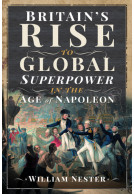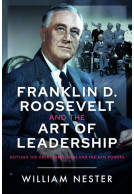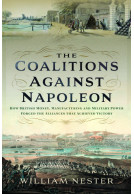Google Books previews are unavailable because you have chosen to turn off third party cookies for enhanced content. Visit our cookies page to review your cookie settings.
General George S. Patton and the Art of Leadership (Hardback)
One of America’s Greatest Ever Generals
By
Dr William Nester

Pages: 312
Illustrations: 16 mono illustrations
ISBN: 9781036120900
Published: 6th March 2025

Pages: 312
Illustrations: 16 mono illustrations
ISBN: 9781036120900
Published: 6th March 2025
You'll be £20.00 closer to your next £10.00 credit when you purchase General George S. Patton and the Art of Leadership. What's this?
+£4.99 UK Delivery or free UK delivery if order is over £40
(click here for international delivery rates)
Need a currency converter? Check XE.com for live rates
(click here for international delivery rates)
Need a currency converter? Check XE.com for live rates
| Other formats available | Price |
|---|---|
| General George S. Patton and the… ePub (9.2 MB) Add to Basket | £14.99 |
For General George S. Patton, “Leadership is the thing that wins battles. I have it—but I’ll be damned if I can define it. Probably it consists in knowing what you want to do and then doing it and getting mad if anyone steps in the way. Self-confidence and leadership are twin brothers.”
Indeed, Patton excelled at virtually every dimension of leadership, most vitally as a war commander. His record as a general is clear. The larger, more armored, and better supplied his armies, and the freer he was to decide what to do with them, the more rapid and further they advanced to inflict more defeats on the enemy. In that no other American army commander matched him during World War II. That ranks Patton among the Valhalla of America’s greatest generals, with him most resembling Thomas “Stonewall” Jackson and Nathan Bedford Forrest as a fast-moving, hard-hitting commander who repeatedly outflanked and devastated enemy forces.
Patton led from the front and tried to inspire his troops by being a model officer who exemplified bravery, problem-solving, tactical brilliance, and decisiveness. He was in near constant motion from his headquarters to rear echelon and front line troops, everywhere exhorting them to greater efforts and overcoming challenges, at times enduring shell fire, strafing, mines, snipers, and other dangers. His greatest attribute was his drive to be the best at whatever he chose or was ordered to do. He recognized that developing a successful military career depended not just on will and chance but on incessant training and study. Yet he believed that instincts were just as vital as skills in being a successful leader: “I have a sixth sense in war and…can put myself in the enemies head and I am also willing to take chances.”
Patton harbored plenty of flaws. He was a narcissist who constantly strove to be center-stage and outshine his rivals. He contrived an idealized version of himself as the epitome of the brilliant general and fearless soldier, immaculately dressed, and spent his life playing that role. He was a braggart who regaled listeners with at times exaggerated tales of his past deeds and those yet to come. His boasting did have one positive element. He sought to surpass his past glories with greater future victories.
Patton seesawed between elation and despair, rage and compassion. He could chew out a subordinate for some mistake in the morning and comfort him for a similar mistake in the afternoon. His quick-temper and provocative views often overpowered his self-control. Twice that cost him an army command. During Germany’s occupation in August 1945, he casually quipped to several reporters that being a Nazi in Germany was no different from being a Republican or Democrat in the United States. For that Eisenhower relieved him from Third Army’s command. Most notoriously, during the Sicily campaign he slapped two soldiers suffering combat fatigue that he accused of malingering.
General George S. Patton and the Art of Leadership is his most psychologically penetrating biography that captures the paradoxical character behind his brilliant military feats and often dismaying failures. Throughout Patton explains his values and deeds through hundreds of quotes along with scores of insights from those who knew him—comrades and critics alike.
There are no reviews for this book. Register or Login now and you can be the first to post a review!
About Dr William Nester
Dr WILLIAM NESTER, a Professor at the Department of Government and Politics, St. John’s University, New York, is the author of thirty-seven books on history and politics. His book George Rogers Clark: I Glory in War won the Army Historical Foundation’s best biography award for 2013, and Titan: The Art of British Power in the Age of Revolution and Napoleon, won the New York Military Affairs Symposium's 2016 Arthur Goodzett Book Award.
More titles by Dr William Nester
Other titles in Frontline Books...


















